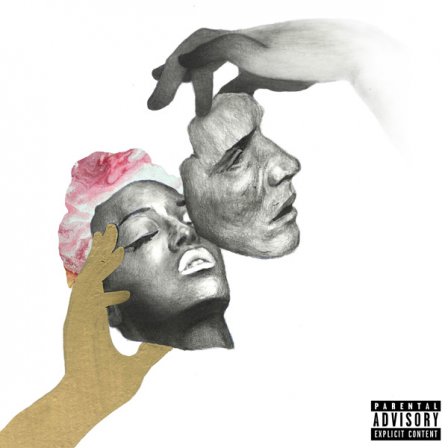Despite the suite-laced sweep of Blackheart, dense and chimeric, I find myself drawn to the misdirect simplicity of its beginning — Dawn Richard’s solo voice, the emotional and musical bedrock of this project. She calls out alone on the crystalline opener “Noir (Intro),” “I thought I lost it all,” into reverberating emptiness. It’s from this emptiness that Noiscastle III’s production reveals the album as a duet, between the music of Richard’s voice and the voice of his music. Much of that music is itself comprised of her voice: the instrumentals are almost always lined with heavily manipulated vocal samples and buried harmonies. Their collaboration recalls the matches-made-in-heaven of Daniel Lopatin + Autre Ne Veut or Arca + FKA twigs/Björk — powerful, elastic voices that shift shape, pitch, and time into an R&B free-fall crash-landing in the tumultuous deep between resentment and re-sentiment. Richard’s lonely opening call is returned with a vocoder double over a resting bass heartbeat, until all falls away to a swell of voice pads and saccharine strings that meet her repeating softly in the storm, like she’s singing to herself, “Tryna find my way.”
This is the sequel to the phenomenal Goldenheart, where she promised we won’t ever see the break of Dawn, but we do see her bend here, as she tries to find her way. This is an artist whose media narrative remains, in the wake of critical acclaim, cluttered by the fallout with Making The Band wonder group Danity Kane. Although she has for the most part forgone the show-stopping choruses of “Bombs” and smoothness of “Frequency,” these 60 minutes of self-searching never sounds passive or aimless. Instead, it’s an immersive, affirmative vision for and about herself battling to make noise in a dampening industry. Blackheart is ongoing and nearly seamless, unselfconscious in its refashioning of 80s guitar licks, steel drums, 256-bit EDM, flutes, and trap snares.
Opening suites “Calypso” / “Blow” and “Billie Jean” / “Adderall / Sold (Outerlude)” are an unfuckwithable 20 minutes that ply styles and play characters. High-point “Calypso” runs through a garbled sample jungle somewhere between Gang Gang Dance, FRIENDZONE, and PC Music into a cascade of vocal runs. Her calypso drum “bum bum bum” manifests in the drumming of “Blow,” whose chorus takes a backseat to the shifting segments all around it. “Billie Jean” alternates between spacious snapping percussion and ornate violins, as Richard comes to applaud the titular figure’s self-possession (Michael Jackson is also a reference for Richard’s range-spanning vocals here and throughout). Eventually, Richard emerges into “Adderall / Sold (Outerlude),” run down and burned out. She sings in the third-person of herself-as-Billie-Jean, “All the days when she slept till noon/ She was living like she’s dying soon.” Sawing synths stab like the imminent immanence of that living deadness, and then a stomping kickdrum and 80s dark pop guitar lick loops like death. It’s a spiritual successor to Frank Ocean’s “Pyramids,” about the difficulty of treading water in resplendent depression. The song sustains a tension that characterizes Blackheart, the fight to get up and over.
The only missteps come late, after an almost unbroken stream of generic reinventions and personal deconstruction. They are the back-to-back commercialized pop incarnations “Castles” (produced by Swagg R’Celious, the only track not handled by Noisecastle) and “Phoenix,” which interrupt the album’s restless dis/continuity. The songs’ vanilla verse-chorus structures and streamlined instrumentals aren’t offensive — they sound like the more middling pop anthems buried on Pink Friday — but play counter to the subtle (“Swim Free,” “Titans”), passionate (“Warriors”), slow-burning (“Projection,” “The Deep”) songwriting that characterizes the rest of Blackheart. After being swept up in the album’s push and pull, it’s off-putting to have the catharses telegraphed. The obvious emotionality of “Castles” and “Phoenix” also casts a harsher light on the more ham-fisted arrangements elsewhere (bittersweet strings, “Beat It” guitar, maximalist EDM pop). But these camp indulgences are hardly enough to derail the forward-leaning momentum Richard and Noisecastle have amassed up to that point, and might even serve the radical self-love that motivates the album.
After all, it comes back to her voice and what she says with it. On the small standout interlude “Choices,” Richard sings, “If I had to choose/ I would never lose/ I would choose me.” It’s a simple uplifting phrase, but one that bespeaks the feminist act and power of invention of her musicmaking. It’s the empowered beating heart of an album that utilizes the arsenal of Richard’s voices, ear for melody, and rippling production choices to make a way for herself that she might not otherwise find. And it sounds like a revelation.
More about: Dawn Richard, D∆WN




